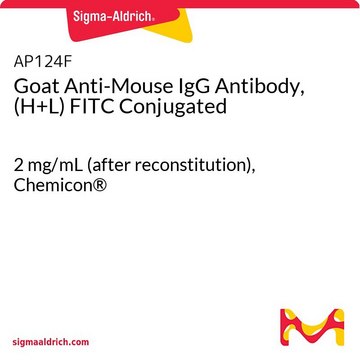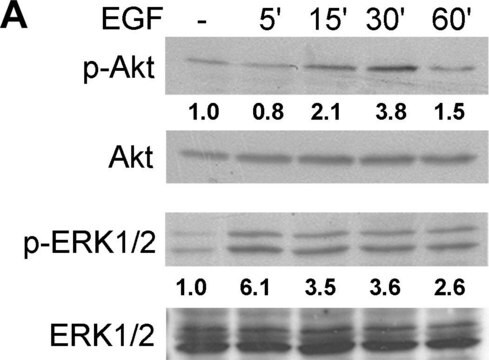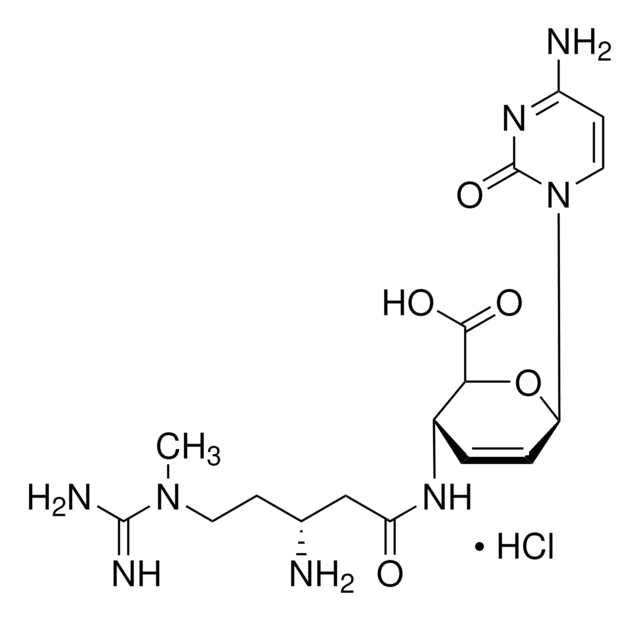おすすめの製品
由来生物
mouse
品質水準
抗体製品の状態
purified immunoglobulin
抗体製品タイプ
primary antibodies
クローン
1E6, monoclonal
化学種の反応性
human
メーカー/製品名
Chemicon®
テクニック
ELISA: suitable
immunofluorescence: suitable
western blot: suitable
アイソタイプ
IgG2b
輸送温度
wet ice
特異性
カプシドタンパク質のコード領域であるORF2.1
免疫原
エピトープ:aa 434-457
アプリケーション
ELISA
イムノブロッティング
免疫蛍光染色
最適な希釈濃度は、ご自身で決定してください。
イムノブロッティング
免疫蛍光染色
最適な希釈濃度は、ご自身で決定してください。
抗E型肝炎ウイルス抗体、aa 434-457、クローン1E6は、E型肝炎ウイルスのレベルを検出します。WB、ELISA、IFでの使用が文献発表され、検証されています。
研究のカテゴリー
感染性疾患
感染性疾患
研究のサブカテゴリー
感染性疾患-ウイルス性
感染性疾患-ウイルス性
物理的形状
0.25 M塩化ナトリウムを含有する0.02 M PB(pH 7.6)に溶解。0.1%アジ化ナトリウムを含む。
フォーマット:精製
保管および安定性
2~8℃で受領日から最大12カ月間保存できます。
その他情報
濃度:ロットに固有の濃度につきましては試験成績書をご参照ください。
法的情報
CHEMICON is a registered trademark of Merck KGaA, Darmstadt, Germany
免責事項
メルクのカタログまたは製品に添付されたメルクのその他の文書に記載されていない場合、メルクの製品は研究用途のみを目的としているため、他のいかなる目的にも使用することはできません。このような目的としては、未承認の商業用途、in vitroの診断用途、ex vivoあるいはin vivoの治療用途、またはヒトあるいは動物へのあらゆる種類の消費あるいは適用などがありますが、これらに限定されません。
適切な製品が見つかりませんか。
製品選択ツール.をお試しください
保管分類コード
10 - Combustible liquids
WGK
WGK 2
引火点(°F)
Not applicable
引火点(℃)
Not applicable
適用法令
試験研究用途を考慮した関連法令を主に挙げております。化学物質以外については、一部の情報のみ提供しています。 製品を安全かつ合法的に使用することは、使用者の義務です。最新情報により修正される場合があります。WEBの反映には時間を要することがあるため、適宜SDSをご参照ください。
Jan Code
MAB8002:
試験成績書(COA)
製品のロット番号・バッチ番号を入力して、試験成績書(COA) を検索できます。ロット番号・バッチ番号は、製品ラベルに「Lot」または「Batch」に続いて記載されています。
Fabian Z X Lean et al.
The Journal of general virology, 103(11) (2022-11-11)
Ferrets are widely used for experimental modelling of viral infections. However, background disease in ferrets could potentially confound intended experimental interpretation. Here we report the detection of a subclinical infection of ferret hepatitis E virus (FRHEV) within a colony sub-group
Martijn D B van de Garde et al.
Journal of virology, 90(9), 4394-4401 (2016-02-19)
Genotype 3 (gt3) hepatitis E virus (HEV) infections are emerging in Western countries. Immunosuppressed patients are at risk of chronic HEV infection and progressive liver damage, but no adequate model system currently mimics this disease course. Here we explore the
Wenhai Yu et al.
BMC infectious diseases, 18(1), 687-687 (2018-12-24)
Hepatitis E virus (HEV) is a leading cause of hepatitis worldwide. However, its infection biology and pathogenesis remain largely elusive. Furthermore, no proven medication is available for treating hepatitis E. Robust experimental models are urgently required to advance the research
Yunlong Li et al.
Antiviral research, 184, 104967-104967 (2020-11-03)
Exposure to hepatitis E virus (HEV) bears a high risk of developing chronic infection in immunocompromised patients, including organ transplant recipients and cancer patients. We aim to identify effective anti-HEV therapies through screening and repurposing safe-in-human broad-spectrum antiviral agents. In
Marie Pellerin et al.
Viruses, 13(3) (2021-04-04)
Hepatitis E virus (HEV) is considered as an emerging global health problem. In most cases, hepatitis E is a self-limiting disease and the virus is cleared spontaneously without the need of antiviral therapy. However, immunocompromised individuals can develop chronic infection
ライフサイエンス、有機合成、材料科学、クロマトグラフィー、分析など、あらゆる分野の研究に経験のあるメンバーがおります。.
製品に関するお問い合わせはこちら(テクニカルサービス)




